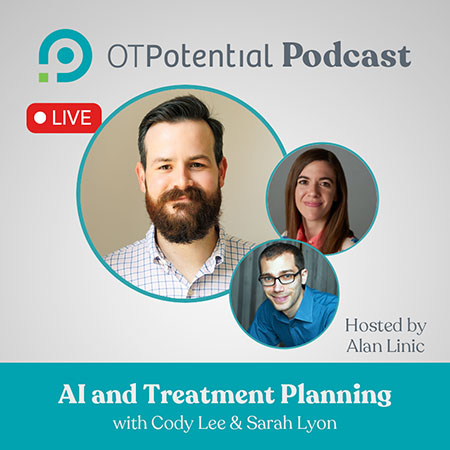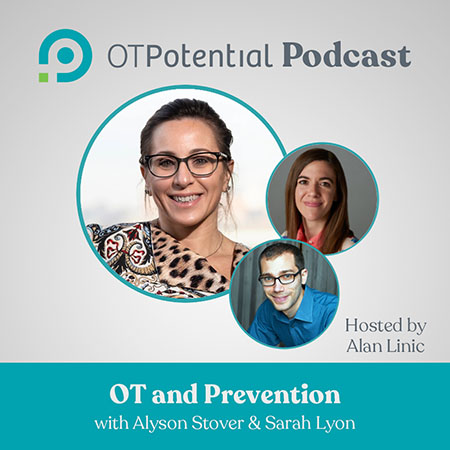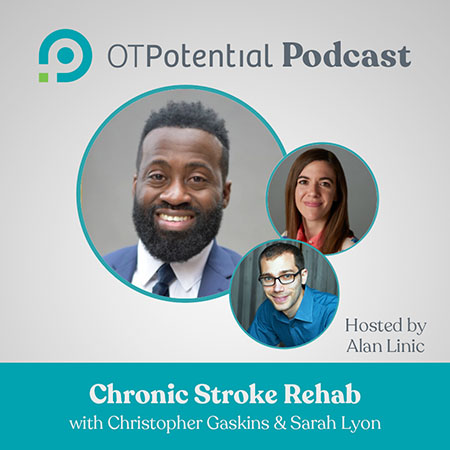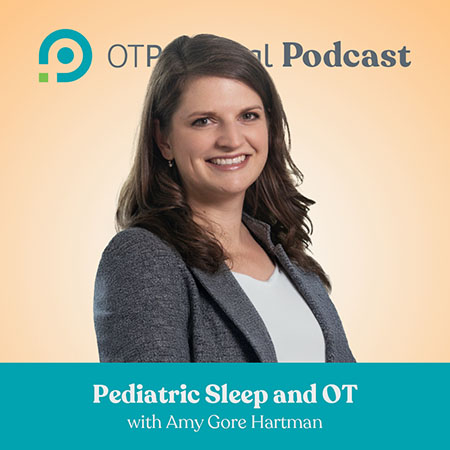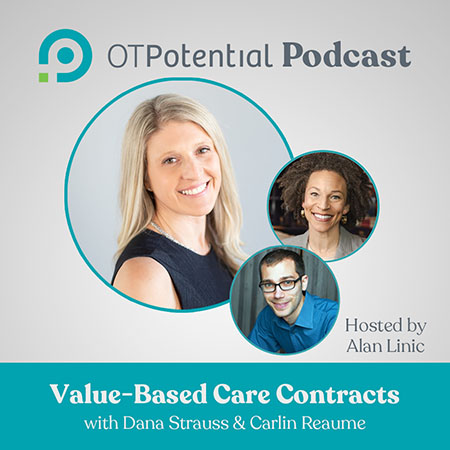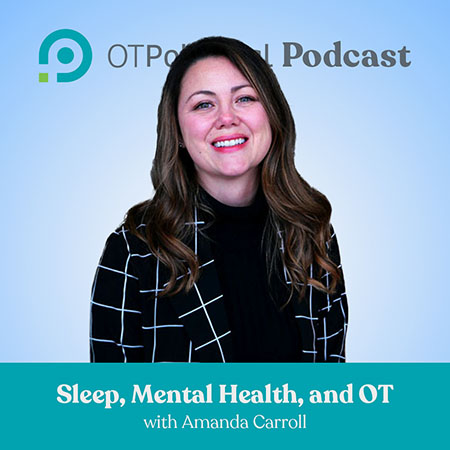Earn 1 hour of continuing education by joining OT Potential after taking this course.
As occupational therapists, many of us have witnessed the wonder of motor learning in neuro rehab.
Yet despite years of research attempting to identify the most effective post-stroke interventions, the reality is that our understanding of how to improve recovery of function remains incomplete.
The article we are reviewing today serves as an update on the state of the science in how new theories of motor control and learning can be incorporated into practice.
The authors put particular emphasis on how new technologies may be needed to truly meet the many principles of neuroplasticity, and in particular they point to virtual, augment, and mixed reality technologies.
After we review the research, we are excited to welcome to the podcast an OT who works for one such virtual rehab solution as their Manager of Clinical Services, Katie Riccio, MS, OTR/L. Katie will share what she has learned about neurorehab in her role. And orient us to the stroke rehab tech tools on the market, how they can intersect with you in-person practice—and what to expect on the horizon.
Primary Journal Article Explored
When you log in, be sure to check out the OT Potential Club’s written breakdown of the following research article. Then, share your questions and thoughts with fellow practitioners.
Supporting Research and Journal Articles
- Application of Home-Based Wearable Technologies in Physical Rehabilitation for Stroke: A Scoping Review.
- Neurorehabilitation From a Distance: Can Intelligent Technology Support Decentralized Access to Quality Therapy?
- Advances and Challenges in Stroke Rehabilitation.
Learning Objectives
- You will be able to identify how virtual rehab can help meet the principles of neuroplasticity in OT treatment.
- You will be able to recognize how virtual rehab can augment in person OT.
Agenda
Intro and breakdown and analysis of journal article
- Intro to motor learning in neurorehab
- What was the intent of this research?
- Theories of motor control and learning
- General principles of exercise dependent neuroplasticity
- Applications of motor control and learning principles in neurorehab using VR
- Authors discussion/conclusions
Discussion on practical implications for OTs
- Can you tell me about your journey to your current job?
- Can you tell me about Neurophenix and how it fits into the larger ecosystem of virtual neurorehab?
- What were your impressions of this research?
- Did you find any of the theories presented helpful?
- How do you currently understand the interplay between in person rehab and virtual rehab?
- How are virtual rehab options currently paid for?
- What have you learned from your work about intensity levels in UL neuro rehab?
- What have you learned about the importance of progressive levels of challenge in neurorehab?
- What have you learned about feedback and its role in stroke rehab?
- In your view, what remains missing from virtual stroke rehab? (And, what changes do you see on the horizon?)
- How do we as OTs position ourselves as experts in stroke tech rehab?
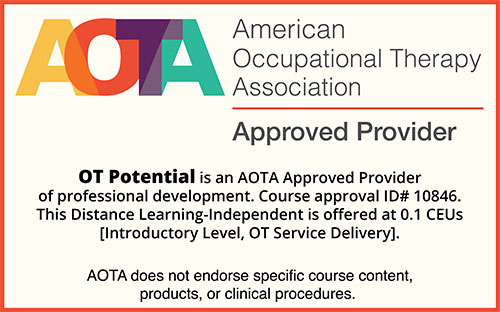
Instructional Methods/Registration/Special Needs Requests/Cancellation Policy
This course is an independent/self-study course delivered via podcast on iTunes, Spotify, Google Play & more.
If you need accommodations to take this course, please contact us and we will address your needs on an individual basis.
If we cancel a promoted course, event, live stream, or any other paid CEU offering prior to release, and you subscribe explicitly for said offering, you are eligible for a full refund if you did not complete and earn any other CEU quizzes or certificates during your subscription.
If a live webinar is cancelled that you signed up for, our system will automatically generate an email to you and if possible, we will inform you of the rescheduled date. Our most current webinar schedule will be found at: otpotential.com/live-ot-ceu-webinars.
Course Completion Requirements
In order to receive a certificate for this course, you must first participate in the podcast/webinar in its entirety. Then, you will need to take the quiz that will accompany the course and earn 75% or higher. If you pass, a certificate will be automatically generated and sent to your email. Quizzes for live (distance learning–interactive) webinars must be completed within 3 days of completing the webinar.
Target Audience/Educational Level
Our target audience is occupational therapy practitioners who are looking to learn about OT and Ehlers Danlos Syndrome. The educational level is introductory.
Financial and Non-financial Disclosures
It is the policy of OT Potential to disclose any financial and non-financial interest the provider or instructor may have in a product or service mentioned during an activity. This is to ensure that the audience is made aware of any bias of the speaker.
We here at OT Potential have no financial stake in this topic.
Speakers
Katie Riccio, MS, OTR/L

Katie has a BS in Exercise Physiology with a specialization in Gerontology, and an MS in Occupational Therapy. She has two decades of experience in adult rehabilitation across sub acute, inpatient and outpatient settings, as well as experience in upper extremity robotics research. Katie’s focus areas include upper extremity rehabilitation, driver evaluations, neurological rehabilitation and rehab technology.
Katie is currently working for Neurofenix as the Manager of Clinical Services educating clinicians, caregivers and clients on their upper extremity programs utilizing their NeuroBall Platform technology.
Sarah Lyon, OTR/L

Sarah’s passion is helping fellow OT practitioners translate evidence into daily practice. Sarah earned her BA in religion from St. Olaf College, then earned her master’s degree in occupational therapy from New York University in 2011.
Since then, she’s worked in numerous facilities, including a critical access hospital, an acute trauma hospital, and a state inpatient psychiatric hospital. Sarah is the founder/owner of OT Potential. Read more about OT Potential here.
This course was designed to meet your continuing education requirements
We designed the courses in the Club to meet the requirements for “online” and “independent/self-study” courses. To verify the requirements from your specific state (within the US), check out our post, OT Continuing Education Requirements. If you are outside of the United States and have questions, please contact us.
We are proud to be an AOTA Approved Provider and to meet the requirements for your NBCOT renewal.
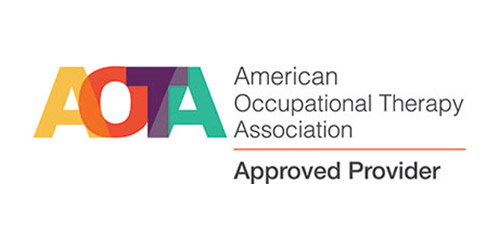
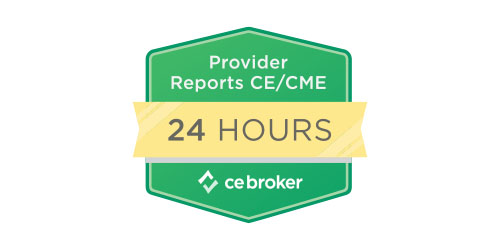
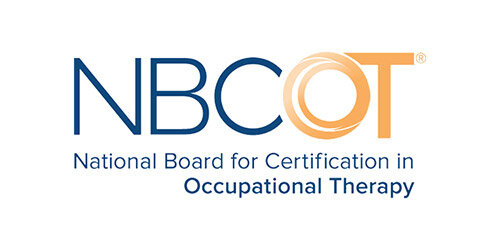
See our other OT courses!
Motor Learning in Neuro Rehab • OT Potential

OT Potential is dedicated to connecting members and visitors to resources about evidence-based practice in occupational therapy. The OT Potential Club serves as a clinical decision support tool through exploring new OT research in a journal club style, which features a weekly occupation therapy forum discussion and monthly OT CEUs courses.
Course Provider: Organization
Course Provider Name: OT Potential
Course Provider URL: https://otpotential.com/
Course Mode: Online
Start Date: 2024-10-24
Duration: 1:00:00
Repeat Count: 5
Repeat Frequency: Yearly
Course Type: Subscription
4.88


